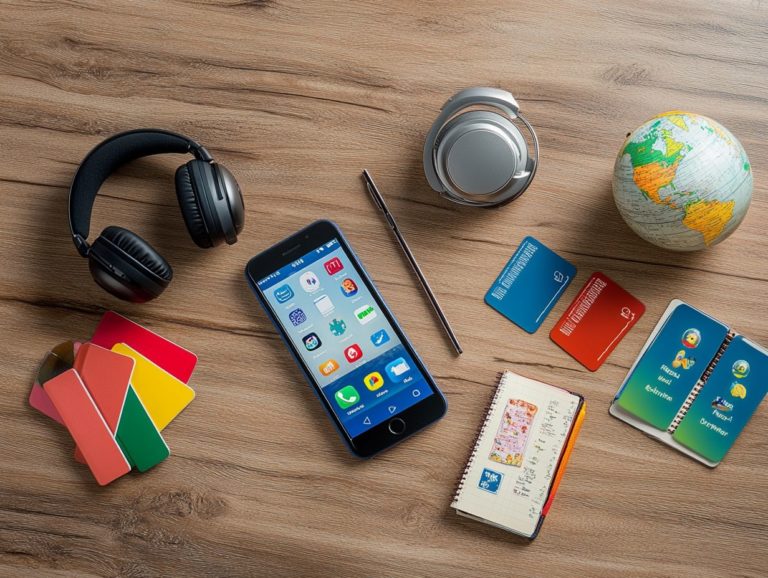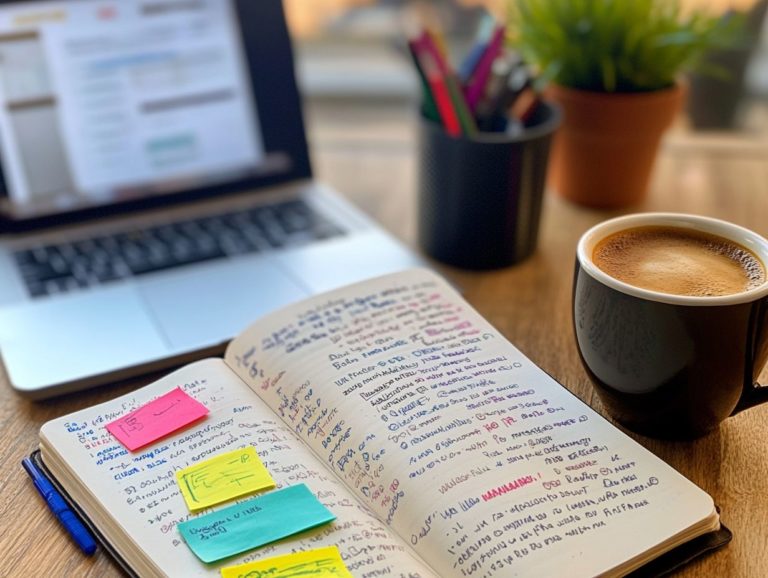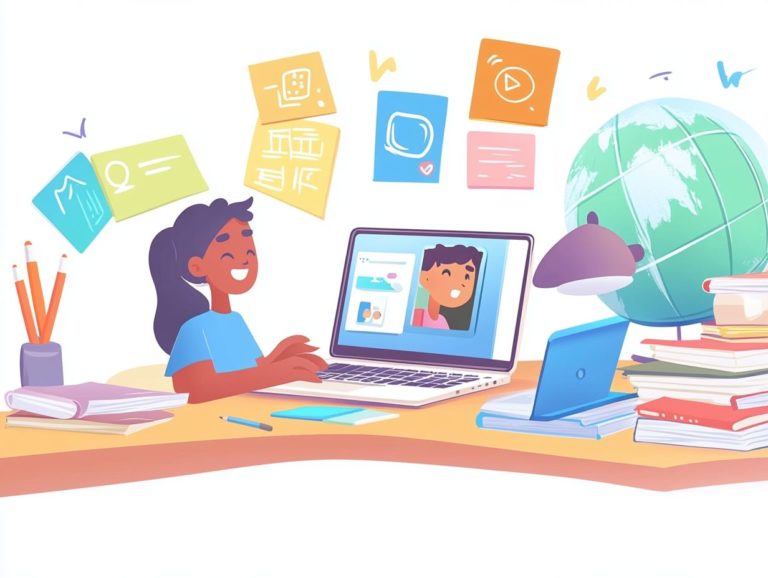The Impact of Social Media on Language Learning
Social media has revolutionized the way you connect, share, and learn. It has become an incredibly potent tool for language acquisition.
This article explores various platforms that facilitate your language learning journey, showcasing the benefits of engaging with native speakers and crafting interactive experiences that keep you engaged.
However, it’s not all smooth sailing. Challenges like distractions and misinformation will also be addressed.
You’ll discover effective strategies to maximize your learning potential and gain insights into the future of social media in this ever-evolving landscape.
Join now to unlock the secrets of harnessing social media for your language learning journey!
Contents
- Key Takeaways:
- The Role of Social Media in Language Learning
- Why Social Media is Your Best Language Learning Ally!
- Challenges of Using Social Media for Language Learning
- Effective Strategies for Using Social Media in Language Learning
- The Future of Social Media in Language Learning
- Frequently Asked Questions
- What is the impact of social media on language learning?
- How has social media made language learning more accessible?
- What are some examples of how social media has made language learning more interactive and engaging?
- What are the benefits of using social media for language learning?
- Are there any disadvantages to using social media for language learning?
- How can I use social media to improve my language learning?
Key Takeaways:
- Social media provides improved access to native speakers, allowing for real-life language practice and cultural immersion.
- By utilizing social media platforms, language learners can engage in interactive learning experiences that promote fluency and retention.
- Effective strategies for using social media in language learning include setting goals, staying focused, and utilizing language learning communities for support and resources.
The Role of Social Media in Language Learning
The role of social media in language learning has undergone remarkable evolution, especially during the COVID-19 pandemic. Traditional classrooms transitioned to online environments.
Platforms like Facebook, Twitter, Instagram, and YouTube have become essential social networking sites that significantly enhance language acquisition and global English proficiency.
These platforms offer unique opportunities for you to engage with native speakers, share what you write or say in the language, and dive into multilingual communication.
This shift has transformed education. It makes language learning a truly dynamic experience.
Overview of Social Media Platforms for Language Learning
Various social media platforms, such as Twitter, Facebook, YouTube, Instagram, LinkedIn, and Snapchat, are instrumental in enhancing your language skills, whether you’re learning English or another language.
Each platform brings its own unique features that cater to different facets of language acquisition. For instance, Twitter’s character limit encourages you to express yourself concisely, which can aid in vocabulary development.
On Facebook, the group functionality allows for informal communication, promoting your interaction skills through real-time dialogue. YouTube acts as a visual aid, enabling you to learn pronunciation and context with engaging videos.
Instagram’s emphasis on visuals can deepen your understanding of idiomatic expressions, while LinkedIn connects professional language skills with valuable networking opportunities.
The demographic diversity across these platforms from lively adolescents on Snapchat to seasoned professionals on LinkedIn underscores their importance in language education. They allow you to engage with a wide array of cultural contexts and communication styles.
Why Social Media is Your Best Language Learning Ally!
Utilizing social media for language learning presents a wealth of advantages. You gain enhanced access to native speakers, facilitating authentic interactions that enrich your learning experience.
This dynamic environment fosters engaging opportunities for interaction, significantly improving your communication skills and amplifying your exposure to the language.
Improved Access to Native Speakers
One of the primary advantages of utilizing social media in your language learning journey is the enhanced access to native speakers. This opens the door to a variety of communication tools, allowing you to engage in authentic online interactions.
These platforms act as a bridge, connecting you with individuals who can offer invaluable insights into the nuances of everyday language, cultural references, and colloquial expressions.
By participating in discussions, sharing experiences, and directly asking questions to native speakers, you not only expand your vocabulary but also build confidence in your conversational skills.
For instance, through language exchange apps and social media groups, many have formed successful partnerships with native speakers. These partnerships lead to enriching conversations that deepen understanding and foster friendships. This ultimately transforms how you perceive and use your target language.
Engaging and Interactive Learning Experience
Social media creates an engaging and interactive learning experience by seamlessly integrating various educational technologies that spark creativity and enhance essential language skills.
With platforms that promote video sharing, you have the opportunity to create your own content. This allows you to express ideas visually and share knowledge with your peers. Interactive quizzes can further stimulate your skills to think clearly about what you read, engaging you in real-time assessments that challenge your understanding.
Collaborative projects on social media foster teamwork, enabling you to communicate effectively while sharpening your writing abilities.
Successful initiatives like #EdChat and various YouTube educational channels showcase how these digital tools can cultivate vibrant learning communities. They inspire you to connect, collaborate, and exchange ideas in truly innovative ways.
Challenges of Using Social Media for Language Learning
While social media can offer significant advantages for language learning, it also comes with its fair share of challenges. Distractions can easily pull you away from your studies.
The prevalence of misinformation can further complicate your learning journey, leading to confusion and misunderstandings. The lack of structure and guidance on these platforms can hinder your academic performance, making it essential to navigate this landscape thoughtfully.
Distractions and Misinformation
Distractions and misinformation on social media can significantly hinder your language learning journey. It becomes challenging to distinguish between reliable sources and misleading content. This struggle often leads to frustration, causing you to lose sight of your language acquisition goals.
The constant stream of notifications and updates can easily divert your attention away from meaningful practice, ultimately stalling your progress.
To navigate this landscape, it’s crucial to cultivate skills to think clearly about what you read that give you the power to analyze the information you encounter online. By honing your ability to identify credible sources, you can effectively filter out false narratives and deepen your understanding.
Implementing strategies such as:
- Set specific time limits for social media use to maintain focus.
- Create a dedicated study environment.
- Utilize platforms that promote authentic language use.
These strategies can significantly enhance your focus and retention, setting you on a path to language mastery.
Lack of Structure and Guidance
A significant challenge you may encounter when using social media for language learning is the lack of structure and guidance. This can often lead to confusion and ineffective learning strategies.
Without a clear framework in place, navigating the vast array of resources available can be overwhelming. This often results in a disjointed learning experience that hinders your engagement and slows down your progress.
To address this issue, implementing structured learning paths can offer the direction you need. This helps you set achievable goals and track your advancement effectively.
In this context, the role of educators is paramount; they can curate valuable content and provide personalized support tailored to your needs. By guiding you in your social media usage, educators can elevate the quality of your interactions and ensure that your online time is both productive and enriching.
Effective Strategies for Using Social Media in Language Learning
Implementing effective strategies for utilizing social media in language learning will supercharge your learning journey! Start by setting specific goals that guide your progress, and immerse yourself in online language learning communities.
Engaging with like-minded learners and native speakers can transform your journey, making it not just educational but also enjoyable and enriching.
Don’t miss out on transforming your learning journey set your goals today!
Setting Goals and Staying Focused
Setting clear goals is essential for effective language learning on social media. This focus directs your efforts toward specific skills, maximizing progress.
By breaking down your overarching language objectives into smaller, achievable milestones, you can track your progress and keep your motivation high. For example, you might set weekly goals, such as mastering ten new vocabulary words or practicing your conversational skills with a native speaker once a week.
Using social media platforms opens up opportunities to connect with fellow learners and share experiences while receiving valuable feedback. With the countless distractions social media presents, staying focused is crucial. Designate specific times for social engagement and reserve intervals for focused learning.
Utilizing Language Learning Communities
Engaging with language learning communities on social media can significantly enhance your interaction skills and provide invaluable support throughout your learning journey, all while taking advantage of educational technologies to promote multilingualism.
Platforms like Facebook and LinkedIn are treasure troves of resources, offering you language exchange partners, personalized feedback from seasoned speakers, and access to curated materials for independent study. The collective wisdom of these communities helps you tackle common challenges and share practical tips, transforming what could be a solitary endeavor into a more enjoyable experience.
By actively participating in these groups, you can seize opportunities for real-world practice through organized meetups and conversation sessions. This not only hones your language skills but also allows you to build a network of like-minded individuals who share your passion for language acquisition.
The Future of Social Media in Language Learning
The future of social media in language learning holds great promise, as innovative technologies and approaches are emerging to elevate your educational experience in our ever-evolving digital landscape.
Innovative Technologies and Approaches
Exciting new technologies like AI chatbots and augmented reality are here to supercharge your language learning experience! These advancements allow you to interact with dynamic platforms that simulate real-life conversations, making the learning process more immersive and genuinely enjoyable.
With features like voice recognition and instant feedback, you can practice your pronunciation and receive corrections in real time talk about a game changer!
Social media is your gateway to exciting virtual language exchanges, connecting you with native speakers from around the globe.
By incorporating game-like features, such as points and challenges to encourage practice, you ll stay motivated to actively use your newly acquired skills, fostering a vibrant community where your language proficiency can flourish organically.
Frequently Asked Questions
Social media has greatly impacted language learning by providing new and innovative ways to practice and improve language skills. It has made language learning more accessible, interactive, and engaging.
Social media platforms such as YouTube, Instagram, and Facebook have made it easier to access language learning materials, resources, and online communities. This means that learners can access language content anytime and anywhere.
Social media has allowed for real-time communication with native speakers, virtual language exchanges, and interactive language learning games and challenges. These features make language learning more fun and engaging.
Using social media for language learning can improve language skills, increase cultural understanding, and build a sense of community among language learners. It can also provide access to authentic language materials and resources.
While social media has many benefits for language learning, it can also be a distraction. It may not always provide accurate or reliable language content.
Get excited about language learning! Dive into vibrant online communities where people practice different languages together.
Follow language learning accounts, connect with native speakers, and create your own content to share. Start today! The world of language learning is at your fingertips with social media.





